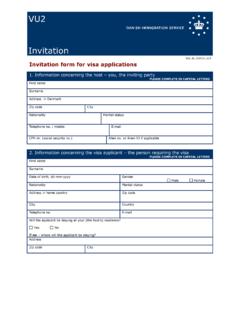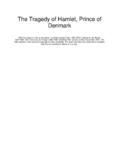Transcription of The Philippine Consulate Copenhagen, Denmark
1 The Philippine Consulate copenhagen , Denmark AUTHENTICATION/LEGALIZATION SERVICES. The Philippine Consulate , performs its authentication/legalization function/services in the context of the 1963 Vienna Convention on Consular Relations. Given the existence of a multi-state system, aforesaid Convention stipulates that, among other things, the various kind of documents sourced from particular sovereign states ( public documents, private documents, and commercial documents) shall have validity or operative effect in another sovereign state's legal jurisdiction after subjected to an agreed upon authentication procedure. I. AUTHENTICATION OF DOCUMENTS FOR USE IN THE PHILIPPINES. Person/s applying for authentication/legalization of documents may do it in person or by post. Following the guidelines of the 1963 Vienna Convention on Consular Relations, the process consists of a so-called chain authentication as follows: 1.
2 The applicant must first have the original document and its English translation notarized by a Notary Public. (Please note that the Philippine Embassy requires that documents not in English be translated into English at all times.). 2. Afterwards, the signature of the Notary Public must then be legalized by the Ministry of Foreign Affairs of Denmark depending on the document's origin. 3. Finally, the signature of the Ministry official will be authenticated by the Philippine Consulate in copenhagen . Documents without the signatures and seals of both the Notary Public and the Ministry of Foreign Affairs will not be processed. A. For Applications in Person Aside from the required documents and procedures above, the applicant must make sure to bring his or her valid passport and a clear photocopy of its data page. Please refer to the table below for fees. Note that for walk-in applicants, the Embassy only accepts cash payments.
3 B. For Applications by Post The applicant must mail all the documents meeting the above requirements together with a clear photocopy of the data page of the applicant's valid passport and a self-addressed envelope to the Consulate 's mailing address. Payment must be made via the bank. Please refer to the table below for fees and the Embassy's bank details. II. OTHER LEGAL/NOTARIAL SERVICES. Consular officers of the Philippine Consulate in copenhagen also perform and assist in: the administration of all oaths and affirmations provided for by law and in all matters incident to the notarial office;. the execution of affidavits, depositions, and other documents requiring an oath receipt of proof and acknowledgment of all writings relating to commerce and navigation acting as magistrate, in the writing of affidavits, and making declarations and certifying to the truth thereof. A. Affidavit of Acknowledgment An affidavit is a written statement taken under oath before a notary public or magistrate.
4 In the execution of affidavits, facts within the personal knowledge of the affiant must be made directly, positively and fully. If the matters stated in the affiant's affidavit rest upon information derived from others rather than on facts within the personal knowledge of the affiant, then the affidavit must state that such matters are true to the best of his knowledge and belief. If an affidavit is made by a Filipino before a foreign Notary Public and the affidavit shall be used in the Philippines, the affidavit must be authenticated by the Ministry of Foreign Affairs of the country where the affidavit was notarized. The affidavit shall in turn be authenticated by Philippine consular officials. A consular official performs the function of a notary public and the consular section of the Philippine embassy may execute affidavits. An acknowledgment is the act by which a person who has executed an instrument such as an affidavit goes before a competent officer such as a consular official and declares it to be his true and voluntary act and deed.
5 When a Filipino citizen who has executed an instrument appears personally before a Philippine consular officer and makes an acknowledgment of it, the Philippine Consulate shall execute a certificate of acknowledgement. The Philippine citizen making the oath is required for the purpose of identification to produce his/her valid Philippine passport. If the acknowledgement is made by foreign notaries public or officials, it should in turn be certified by the Ministry of Foreign Affairs of the country where the affidavit was notarized and then authenticated by Philippine consular officials. B. Downloadable Forms (click below). Affidavit of Support Affidavit of Support and Consent to Travel and Special Power of Attorney Special Power of Attorney Parental Travel Permit POEA Standard Employment Contract For applications sent by post, please pay the appropriate fees to Danske Bank 9543 4776 460540.
6 Applicants are reminded to indicate the following details in the bank transfer form: IBAN DK 493000 4776. 460540. SWIFT: DABADKK. Bank sending charges must be paid by the applicant. Please instruct your bank to send the corresponding credit advice of your payment remittance, with your full name indicated in the message box. The Consulate will start processing your application only upon receipt of the credit advice.





